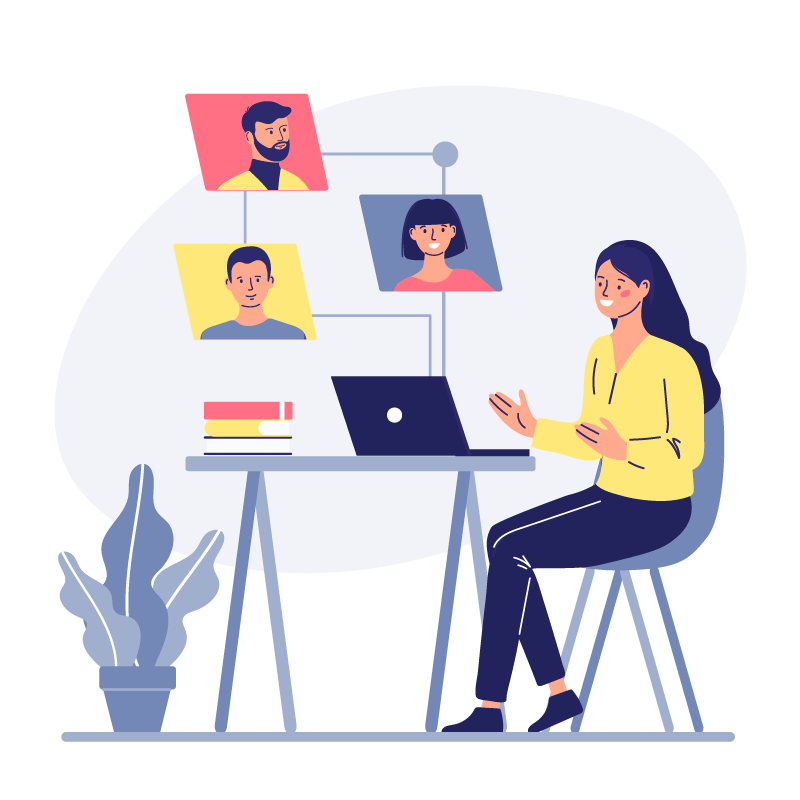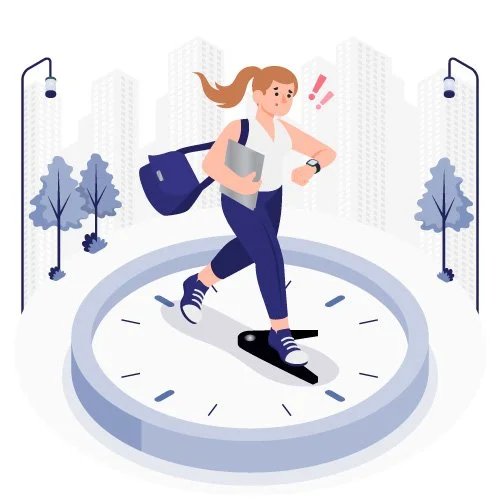INTERVIEW INSIGHTS
Most interview processes start with a phone interview when the recruiter will do an initial screening of candidates to be sure they really do have the basic qualifications for the job. Nothing too in-depth. It’s kind of a nice way to get your feet wet if, like me, you haven’t interviewed for a job in 35 years. Unfortunately for me, the first company I interviewed with didn’t follow the standard process.
Right Into the Deep End
My first interview experience was for an instructional designer role with a company that primarily contracts with the Department of Defense, providing high-tech training solutions for the military. To be honest, I applied because the company was located 15 minutes from where my 88-year-old mother lives. It would be a 45-min commute for me, which I wouldn’t mind. That’s what my commute to school was. I’m kind of on-call 24/7 for my mother, who is failing quickly but still living alone. The top of this company’s salary range was about $10,000 less than I was making as a teacher (I’ve been very fortunate to teach in CT where teacher salaries are more reasonable), but I had been monitoring job boards. Glassdoor.com confirmed that the average salary for a corporate instructional designer was between $75k-$85k. I knew I would be taking a pay cut to start.
I was SO nervous going into this interview! I was told by the HR rep who set up the appointment that I should plan for the interview to take two hours! I would be meeting 1:1 with 4 different people for 30 minutes each. I asked what the roles of the interviewers were to get some perspective. Two of the interviewers were Senior Instructional Designers and the other two were Project Managers. This would be the entire interview process and I would have an answer within a couple of weeks.
They all asked very similar questions. What types of learning solutions have I created? Can you walk us through your process? How have you evaluated the effectiveness of your solutions in the past? There were more, but none of them were unexpected or difficult to answer. I was so nervous that I had to stop and breathe and glance at my cheat sheet several times. They all brought up my lack of military experience and asked how I would approach working with the subject matter experts on topics and procedures that I have no firsthand knowledge of. Military experience was “preferred” in the job description, so I was expecting this. I described my long history of tackling challenging topics in the past, my passion for learning new things, and my comfort with open, honest, and respectful communication.
A two-hour interview was so intimidating to think about, but it wasn’t two straight hours of questions fired at me. Each interviewer took the first 5-10 minutes to introduce themselves and tell me about the company. I thought that was strange because I’d already done a ton of research on the company. I can’t imagine applying to a company that you know nothing about. They definitely hadn’t organized much of a plan for the interviews because each one of them started with similar information and asked similar questions. My responses were actually pretty smooth by the fourth time around. Their questions took about 15 minutes each time, leaving the last 5 minutes for my questions. I pulled from my list of questions and asked a different one each time, but I added one other question based on what I learned from the interviewers’ descriptions of their process. It didn’t sound like there would be much of an opportunity to be creative in their process. I had already expressed my attraction to the company’s culture and emphasis on innovation at all levels. I just wasn’t convinced that there would be much room for me to be innovative in my role. They each confirmed that there “may be some opportunity to be creative and push innovative training strategies, but a lot of the time when the client says they want a PowerPoint they just want a PowerPoint.”
I left the interview feeling relieved and proud of my overall performance. I truly felt that if they gave the job to someone else it would be because the other applicant had military experience. Part of me had my fingers crossed for a job offer because it would be such a relief to complete my transition out of the classroom so quickly and my mother could rest easy that I would still be nearby every day. It wasn’t until my interview with the second company that I realized the first one wouldn’t have been a great fit for me.
Interview Take 2
The second company was a bank. The topic of finance has never really interested me, and I was a little worried I would be bored with the subject matter of the learning solutions. On the other hand, they were apparently interested in me, so I was as invested in the process as I was going into my first interview experience. The bank’s hiring process was pretty standard, starting with the phone interview with the recruiter. The call was one week after that first company’s interview. The recruiter was really nice, and the call lasted about 10 - 15 minutes. She asked me some pretty basic questions, confirming my experience with the tools and performing the ID process. She let me know that she would be sending me on to the next level, recommending me to the hiring manager. However, she couldn’t promise me an interview because it would depend on what the hiring manager thought about my portfolio. She had been screening applicants for this position for 5 months, and a majority of the portfolios didn’t meet the standards the hiring manager was looking for. She said I could expect a call within a week to either let me know I wouldn’t be going further or to schedule the next step interview.
The call came the very next day, and the next round interview was scheduled for the following week. In the meantime I continued to apply to jobs and network on LinkedIn while polishing my interview responses. By the time my 2nd round interview came around, I had landed interviews with two more companies. One was another Department of Defense contractor so I had reservations, but I went ahead and scheduled the interview for a couple of weeks later. The other interview request was for a temporary contract position. I was really looking for a full-time position, but I thought a short-term job would be great while I continued my job search. This was for a healthcare training company that had 44 Storyline courses to be created in the next 3 months. The courses would take an average of 3-4 days to complete, and the pay was $1,000/course. That would work for me!
The morning of my 2nd interview with the bank, I got a call from my son who was supposed to drive my mother to her hair appointment around the same time as the WebEx interview. He was having car trouble and couldn’t help his grandmother out. Now, you need to understand here that nothing - I mean, nothing - can get in the way of my mother’s weekly hair appointments. My mother’s hairdresser works out of her home, and I figured I could call in to the interview from there. So I grabbed my laptop and charger and a decent shirt and rushed out the door. On my 45-min trip to Mom’s apartment, I pulled up an interview simulation video from the bootcamp and practiced my responses. Once Mom was safely in the salon chair, I set up my computer at the stylist’s kitchen counter. I had to prop it up on books so that the interviewers weren’t looking up my nose throughout the interview. I changed my shirt, brushed my hair, and tried to pull myself together.
When You Know, You Know
When I logged into the WebEx meeting, there were three smiling people looking at me - each from their own homes. The interview lasted an hour, but it seemed to fly by. Each person introduced themselves and talked a little about their roles at the bank. The team included the hiring manager and two instructional designers. The atmosphere was fairly relaxed, and as I finished my elevator pitch I realized I wasn’t feeling very nervous. They even commented on my “cute dog” behind me, and I wound up telling the story of how I came to be sitting in my mother’s hairdresser’s kitchen with the hairdresser’s dog whose name I didn’t know behind me. They all had a good laugh at that, which relaxed me even more.
The questions where all based on my past instructional design experience and my answers were based on two main projects - one was a major professional development project I facilitated back in 2008 or 2009 and the other was the volunteer work I was currently doing with the pizza restaurant. When it came to questions about the parts of the process I hadn’t completed with the pizza place, I just explained my planned next steps in the coming weeks.
I believe the timeline of the interview was something close to this: 10 min introductions and elevator pitch, 25 min interview questions, and 20 min my questions. The whole thing felt more like a friendly conversation about instructional design than a test I needed to pass. When it was over, I remember thinking I would love to work with those people. The next day I got the call to schedule a final round interview the following week with the bank, and I already knew I really wanted this job.
I would be interviewing with 3 companies that next week - the DoD company, the healthcare training company, and the 3rd round with the bank. As it turns out, my mother fell sick and was rushed to the hospital two nights before the DoD interview, so I rescheduled for the following week. The healthcare company interview was more of an email sent out to the top 5 applicants (based on our portfolio work) with questions to answer. I was able to do that from Mom’s hospital room. I also managed to submit a few more applications and continue working on my solutions for the pizza restaurant. The Thursday morning of my 3rd round with the bank, I stayed home for it and headed to the hospital right after. This interview was very similar to the 2nd round with another hiring manager, an instructional designer (also former teacher), and a multimedia designer. The questions were also similar and the atmosphere was equally as comfortable and warm. I really felt like I had nailed it, but they said I would hear back within a week. The next day I was offered that healthcare contract job just before the bank recruiter called to extend an official offer! I turned down the contract job, cancelled the DoD interview, and accepted the bank’s offer.





